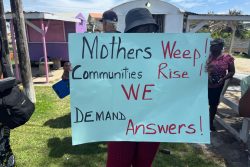WASHINGTON, (Reuters) – The United States today urged Saudi Arabia to show restraint after it sent troops to neighboring Bahrain in a move some analysts said showed the limits of Washington’s influence in the region.
The deployment of 1,000 Saudi troops, at the request of Bahrain’s Sunni royal family, came two days after U.S. Defense Secretary Robert Gates visited the island kingdom and pressed its rulers to implement political reforms to defuse tensions with the Shi’ite Muslim majority.
The Pentagon said neither Gates nor Admiral Mike Mullen, chairman of the Joint Chiefs of Staff who also recently visited Bahrain, had been given no indication that Saudi or other forces from the region would deploy to Bahrain.
The United States, which fears Shi’ite Iran could try to exploit the instability in Bahrain, was cautious in its response to the troop deployment, neither criticizing nor explicitly welcoming it.
“This is not an invasion of a country,” White House spokesman Jay Carney said after Saudi Arabia and other Sunni Gulf governments sent troops and police to the tiny kingdom hit by spreading Shi’ite unrest.
Colonel David Lapan, a Pentagon spokesman, said the Pentagon had “communicated to all parties our concern regarding actions that could be provocative or inflame sectarian tensions.”
In Paris, a U.S. official who spoke on condition of anonymity told reporters that U.S. Secretary of State Hillary Clinton had told the United Arab Emirates’ foreign minister that Washington believes that the solution in Bahrain must come from credible political reform, and not from a military outcome.
The official spoke after talks with Sheikh Abdullah bin Zayed al-Nahayan in Paris, where Clinton was particating in a meeting of foreign ministers from the Group of Eight powers.
The turmoil in Bahrain, a small but important U.S. ally and home to the U.S. Navy’s Fifth Fleet, comes as Washington struggles to formulate a strategy in response to political unrest that has already toppled U.S.-allied governments in Egypt and Tunisia, led to violent protests in Yemen and a bloody rebellion against Libyan leader Muammar Gaddafi.
Saudi Arabia, whose Sunni ruling dynasty is closely allied both with Bahrain’s royal family and with the United States, sent a column of armored troop carriers into Bahrain on Monday to protect government facilities after mainly Shi’ite protesters overran police and blocked roads.
“We urge the government of Bahrain, as we have repeatedly, as well as other GCC (Gulf Cooperation Council) countries, to exercise restraint,” Carney said. The GCC comprises the United Arab Emirates, Bahrain, Oman, Qatar, Kuwait and Saudi Arabia.
Trending









